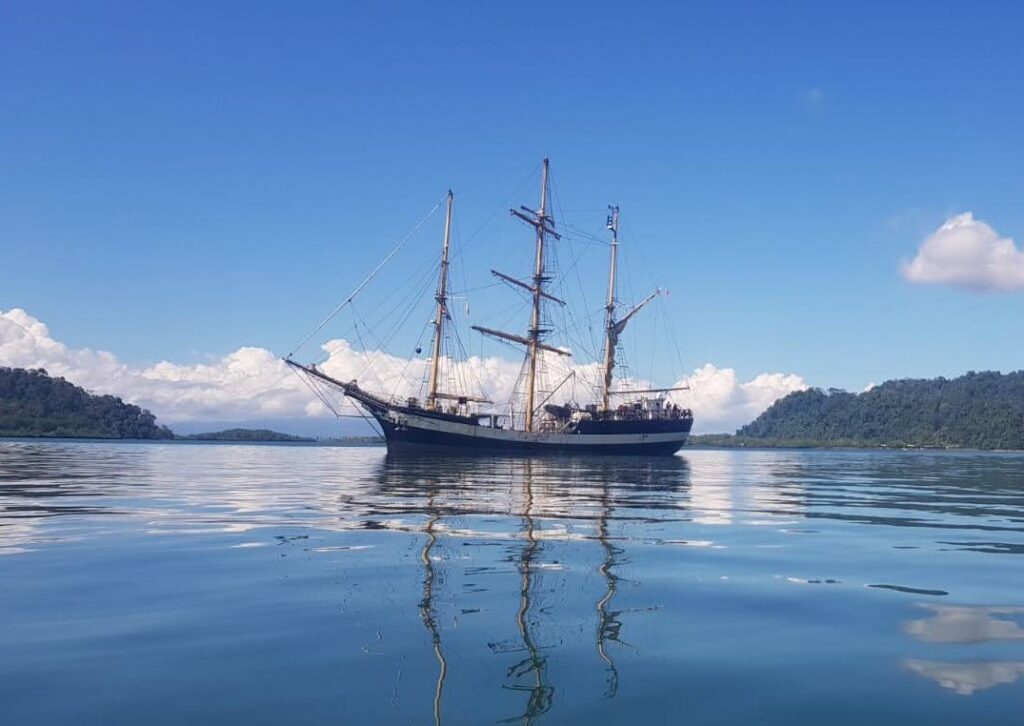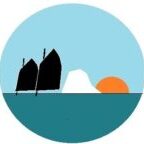Can-do in the Time of Covid
As I promised in my recent posts on my progress with Serchthrift, I thought I would give you some updates on what I got up to over the last several months when I haven’t been building Serchthrift. Most of you will know that I’ve been working on board the Pelican of London, a sail training ship converted from a former fishing vessel during the 90s and early noughties, and which has had a somewhat chequered career up until a few years ago, when things really started to look up for her.
For those of you who don’t know her, she’s a bit of an oddball in the tall ships world, with a unique rig for which most people have comfortably settled on the name “mainmast barquentine”, referring to her three-masted rig, of which only the mainmast is square-rigged. This is based on the concept of the Mediterranean Xebec rig, which was widely employed by the local pirate fraternity, but which was lateen rigged on the fore and mizzen, rather than Pelican’s gaff sails. A more traditional (i.e. slightly pejorative) name for the rig is a Jackass Barquentine, which is my personal favourite (whereas a jackass barque would be a barquentine with both a gaff mainsail and square topsail(s) / topgallant on her mainmast). Anyway, if you need to find out more about the ship I will direct you to the Wikipedia entry and the official website of the charity which owns and runs her.

My involvement with the Pelican is only recent, although I have of course known of her, looked around her, swung the lamp in her saloon etc., etc. in the past. I did briefly flirt with the idea of working on her soon after she was brought into service, but that came to nought, so it was in early March last year, keen to line up some work to go to straight after I finished my Chief Mates’ course in Glasgow in the autumn, that I first met Adrian Ragbourne, the CEO of the charity. Perversely, incidentally, the charity is called Adventure Under Sail, but for various reasons they have recently adopted the trading name of Seas Your Future, which is where you will find them on the web. Anyway, this meeting occurred at Carlisle Premier Inn, just off the M6, one Saturday just before the entire country was plunged into the first lockdown. Had it been a week later, I think it would have been online! He said that there was a good chance of my getting some work over the winter on their forthcoming charter to the German organisation “Ocean College“. This prospect excited me as it was a) work, b) a return to sail training with youngsters, and finally c) a deployment to the Caribbean and Central America! The project is one of my favourite concepts for the use of a tall ship, being a long voyage with a group of high-school aged kids, which combines sail training with elements of adventurous training, and academic and cultural education. My top favourite use for a tall ship, for the record, is nautical education and training, in case anyone is interested and would like to make me a proposal…
Anyway, as you can imagine, for the next six months or so as Covid bit, and then released its grip again, I lived in terror that the whole thing would be cancelled and the ship would be laid up alongside all winter in the same way as so many other sail training ships were. However, very much due to the utter determination (or some might say bloody-mindedness) of Adrian, Johan at Ocean College, and, no doubt, to a great extent the parents who were each forking out half a fortune to send their kids away for the winter, the programme was tweaked to allow for the kids to embark in Germany rather than Bordeaux as originally intended, and the ship sailed.
The whole thing is of course made easier by the fact that once on board, the kids and their teachers form one bubble, and much of the time is of course spent at sea and completely isolated from whatever may be going on ashore (one of the reasons I went to sea for a career in the first place!). Ironically the only way the bubble is then burst is by the periodic handovers of permanent crew and doctors (there was a doctor on board for all but a few days of the trip), as well as any shore time, which is controlled by the teaching staff.
So I spent most of last winter sailing the Pelican with her cargo of teenagers from Madeira across the Atlantic via the Canaries. It was something of a challenge finding a Caribbean country which would let us in, but plumped for Antigua in the end. Covid restrictions limited our ability to explore the West Indies, so instead we stayed in Antigua and Barbuda for a couple of weeks or so, and explored some of the other anchorages outside the main yachtie centres. After that we went to Curacao for Christmas and experienced the joy of an alcohol ban, and then, after discovering that our ultimate destination of Costa Rica wouldn’t let us in on the Atlantic side, making frantic last-minute arrangements for a Panama Canal transit. The students went ashore in Costa Rica for a couple of weeks once we had arrived and cleared in at the lovely natural harbour at Golfito, and I went home on leave.
My leave allowed me to continue with some work on Serchthrift, which is described in more detail elsewhere in this blog, and I rejoined Pelican in February in Bermuda, after flying out from a ghostly, deserted airport. From there we sailed the ship back across to Europe via the Azores and made a brief stop in Dartmouth (no shore leave sadly, as England was once again locked down), before heading up-Channel towards the end of the voyage in Emden. Signing the youngsters off in Emden was a heartbreaking affair after spending so long together, but they returned to their homes having had the experience of a lifetime.
I then delivered the ship back to Bristol with just the permanent crew embarked, and we arrived on the first weekend of the pubs reopening, encountering a city-wide street party in the beautiful spring weather.
After a summer of working on the boat, and then briefly being mobilised in the armed forces’ contribution to the Covid response, I had a further trip on Pelican in late July / August, which saw the ship from Portree on Skye round via Orkney and Shetland (round Muckle Flugga at the very top), down to London, then a short voyage from there which was supposed to finish in Folkestone but actually ended in an unplanned maintenance period in Lowestoft to replace the main engine…
This winter I am repeating my involvement in Ocean College, and as I write I have returned from the outbound transatlantic voyage, and flown home from Antigua. The passage was one of the worst I have known from the point of view of the sailing – we had a period of 8 days of no wind at all, and made more use of the engine than I would have liked.
Hopefully I will be able to write more on the winter’s activities in the new year, but until then, it’s back to boatbuilding…

Interesting blog Chris. Thanks for sharing.